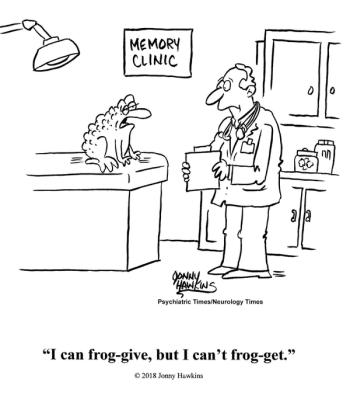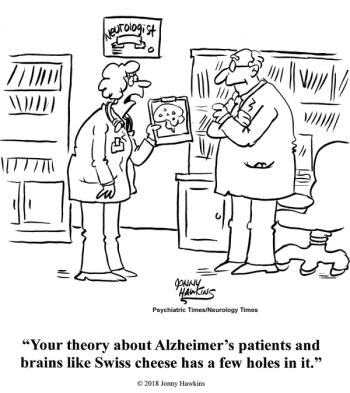
Travelling the middle road between skepticism and scientism in psychiatric research and treatment.

Travelling the middle road between skepticism and scientism in psychiatric research and treatment.

Forgive, but don't forget.

Why did medicine and psychotherapy part ways? How can they be brought back together?

Psychiatrists should discuss fertility with TNB youth during medical and mental health visits—early and often.

That link in the email could be a Trojan horse.

How can volunteering to play video games help brain research?

Donanemab for the treatment of Alzheimer disease has received Breakthrough Therapy designation from the FDA.

For the first time since 2015, Scottish Parliament is considering legislation on medical aid in dying.

"Well-meaning" behavior by parents or guardians could be contributing to high levels of depression, suicidality, substance use, and other adverse outcomes in their child.

The 2021 American Psychiatric Association Virtual Annual Meeting brought together leaders in psychiatry to discuss hot topics including diversity, COVID-19, mood disorders, and more.

There's holes in this theory!

The enduring racial gap in the opiate addiction rate stems largely from racist 19th-century medical beliefs about Black bodies, coupled with substandard medical care provided to Black Civil War troops.

According to a recent study, COVID-19 vaccines did not impact sperm parameters.

Adial’s AD04 for the treatment of alcohol use disorder received a Notice of Allowance from the US Patent and Trademark Office.

Are you properly planning for retirement?

"While I watch the artist paint, I imagine him in the time of plague..."

During the pandemic, this psychiatrist is only able to connect to his beloved grandchild through FaceTime. He considers it a blessing.

Genes may hold the answer to the puzzling comorbidity of migraines and posttraumatic stress disorder.

Is depression the same today as it was in the 17th century? Is it the same thing in Nigeria as it is in the United States? One of the foremost historians of psychiatry weighs in.

Sometimes the war represented more of a hiatus in ongoing research, which was later resumed. In other cases, it led to displacement or imprisonment.

A brain-based perspective could explain how and why psychotherapy leads to enduring change.

The emergence of epigenetic models has generated a surge of optimism, opening new possibilities for psychiatric intervention.

That's one smart phone!

A recent study dives into the data.

Zuranolone showed statistically significant improvement in depressive symptoms in this latest study.

This renowned psychiatrist is donating a portion of the proceeds from his book sales to help stop US military veteran suicides.

The Drug Policy Reform Act, introduced today, intends to decriminalize drug use and possession, providing health-centered approaches and rehabilitation instead.

With a broader and multifaceted understanding of pain, patient care can move from a focus on eradicating pain, as based on objective pain scores, to improving the patient’s quality of life, while simultaneously decreasing pain to a level that is acceptable to the individual patient.

Simple but powerful strategies for drawing on patients’ existing character strengths and long-term goals.

In this CME, learn how to design interventions to promote resilience, study their relative effectiveness, and implement them accordingly.